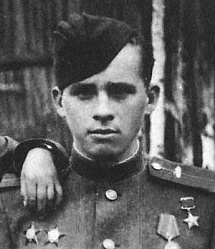- A combat vehicle commander acted like a circus performer. With his right hand he would turn the turret, with his left hand - the main gun, and on the firing pedal which was mechanical he would put his right foot. So we would go on in such way, shivering from the strain: all that you could see was a slice of sky and a slice of earth. You would actually prop yourself up on the floor with your left foot, working with all the other limbs. The mechanical gun firing system employed a set of levers. While these levers got activated, the target would already leave the gun sight. But they (the Germans) had everything electrical! We moved on, maneuvering to and fro, in a zigzag: the driver-mechanic and I had practiced that technique earlier. One foot had to work the lever and moreover direct the driver-mechanic, giving him directions on where to go by touching his head, to the right, to the left. The Tiger Panzer might succeed in hitting from a distance of one and a half kilometers and piercing our T-34 tank. Its point blank range was up to 2 kilometers! We had a 76-mm gun, so we could only kill the German Tiger Panzers at a range of 400 to 500 meters. And then, while maneuvering in the battlefield, it was necessary to figure out the precise moment that my shell would be accurate. When I chose such moment after we had approached at short range, we made a short stop. The “Tiger" began turning around with intention to leave, exposing its side to us! I fired a shot and saw that my shell had hit it. The German tank lit up. Then I stopped firing: I will go further – I thought. But it turned out that my shell had hit their transmission compartment where there was a speed gearbox, steering clutches - and those were burning in the tank. But the Germans not wasting any time turned their main gun around and fired a shot at my machine. Their shell hit us on the right side under the turret, pierced the turret: it had blown the loader to pieces, had blown off the radio operator’s head... When their shell hit us the driver-mechanic’s hatch on latches was slightly opened. He removed the lid and bailed out. I tried to bail out also, but my hatch was closed. And when I opened it, it caused a draught and the flames came at me. There was a four-core cable coming from the tankman helmet to the radio set, to the tank intercom and a connector plugged into a jack. I dashed out, but I had forgotten to pull out the connector and was yanked back into the burning tank... Then I don't remember how and where I succeeded to escape … Somehow I managed to run away about 30 meters and only then did I hear a big bang: the tank exploded as its ammo rack had detonated. I started shaking with my head: I couldn’t hear anything, couldn’t utter anything! I wasn’t even scratched, only shell-shocked and a little bit later regained my senses. I was treated for about 10 days in the field hospital of the medical battalion and began talking and hearing a little bit. Upon my return I was engaged in further fights just at the time when we approached the city of Kamenetsk-Podolsky. When we were approaching the city and fought the battles that caught us after nightfall. Both German and our tanks stood off against each other. We were about run out of fuel. The Germans airdropped fuel to their units. A little bit of miscalculation on their part and we got hold of their fuel.
Want to read full version? Join our support team!Become a patron
| Interview and literary work by: | A. Drabkin |
| Translated by: | N. Kulinich |
| Translation review by: | Charles G. Powers |


